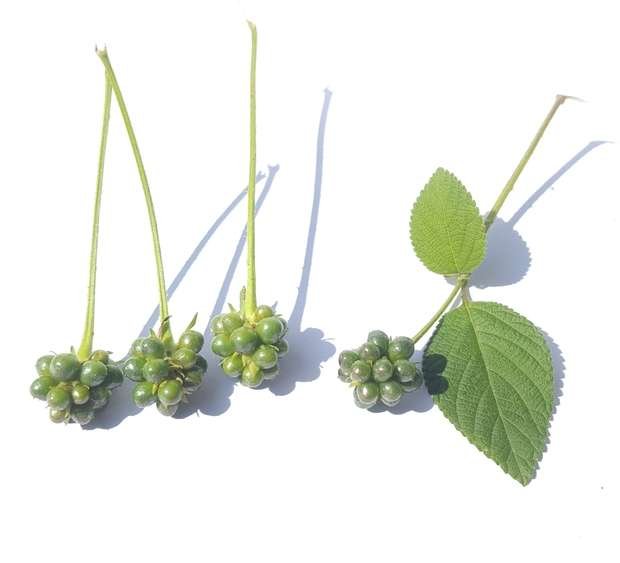Lantana
( Tusepo or common lantana )
- Lantana camara
- IUCN Status: Not Evaluated
- Tree Type: Evergreen

- Kingdom: Plantae
- Clade 1: Tracheophytes
- Clade 2: Angiosperms
- Clade 3: Eudicots
- Clade 4: Asterids
- Order: Lamiales
- Family: Verbenaceae
- Genus: Lantana
Share:
General Information
Lantana camara is a perennial, erect sprawling or scandent, shrub which typically grows to around 2m tall and form dense thickets in a variety of environments. Under the right conditions, it can scramble up into trees and can grow to 6m tall.
The leaves are broadly ovate, opposite, and simple and have a strong odour when crushed.
L. camara has small tubular-shaped flowers, which each have four petals and are arranged in clusters in terminal areas stems. Flowers come in many different colours, including red, yellow, white, pink and orange, which differ depending on location in inflorescences, age, and maturity. The flower has a tutti frutti smell with a peppery undertone. After pollination occurs, the colour of the flowers changes (typically from yellow to orangish, pinkish, or reddish); this is believed to be a signal to pollinators that the pre-change colour contains a reward as well as being sexually viable, thus increasing pollination efficiency. In frost-free climates the plant can bloom all year round, especially when the soil is moist.[
Fun Facts!
Description
The fruit is a berry-like drupe which turns from green to dark purple when mature.
Uses
Lantana camara stalks have been used in the construction of furniture, such as chairs and tables; however, the main uses have historically been medicinal and ornamental. Studies conducted in India have found that Lantana leaves can display antimicrobial, fungicidal and insecticidal properties. L. camara has also been used in traditional herbal medicines for treating a variety of ailments, including cancer, skin itches, leprosy, chicken pox, measles, asthma and ulcers.
L. camara extract has shown to reduce gastric ulcer development in rats.
Lantana camara has been grown specifically for use as an ornamental plant since Dutch explorers first brought it to Europe from the New World. Its ability to last for a relatively long time without water, and the fact that it does not have many pests or diseases which affect it, have contributed to it becoming a common ornamental plant. L. camara also attracts butterflies and birds and is frequently used in butterfly gardens. As an ornamental, L. camara is often cultivated indoors, or in a conservatory, in cool climates, but can also thrive in a garden with sufficient shelter.
Cultivation
Toxicity and Allergies
Lantana camara is known to be toxic to livestock such as cattle, sheep, horses, dogs and goats. The active substances causing toxicity in grazing animals are pentacyclic triterpenoids, which result in liver damage and photosensitivity. L. camara also excretes allelopathic chemicals, which reduce the growth of surrounding plants by inhibiting germination and root elongation.
The toxicity of L. camara to humans is undetermined, with several studies suggesting that ingesting berries can be toxic to humans, such as a study by O. P. Sharma which states “Green unripe fruits of the plant are toxic to humans”. North Carolina State University’s Extension Gardener website states that ingestion of the flowers, fruits, and leaves can cause vomiting, diarrhea, difficulty breathing, and liver failure, while the leaves can cause contact dermatitis. A field guide by the US Department of the Army says the plant can even be fatal. Contrarily, some studies have claimed that the species poses no risk to humans when eaten, and is in fact edible when ripe
No donation to this project yet.
| M | T | W | T | F | S | S |
|---|---|---|---|---|---|---|
| 1 | 2 | 3 | 4 | 5 | 6 | 7 |
| 8 | 9 | 10 | 11 | 12 | 13 | 14 |
| 15 | 16 | 17 | 18 | 19 | 20 | 21 |
| 22 | 23 | 24 | 25 | 26 | 27 | 28 |
| 29 | 30 | 31 | ||||

Livingstone weather
Livingstone, ZM
5:25 PM,
27 July, 2024
clear sky
9 %
1012 mb
5 mph
Wind Gust:
6 mph
Clouds:
5%
Visibility:
0 km
Sunrise:
6:44 AM
Sunset:
6:01 PM
Weather from OpenWeatherMap

